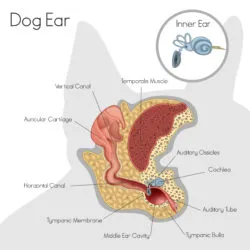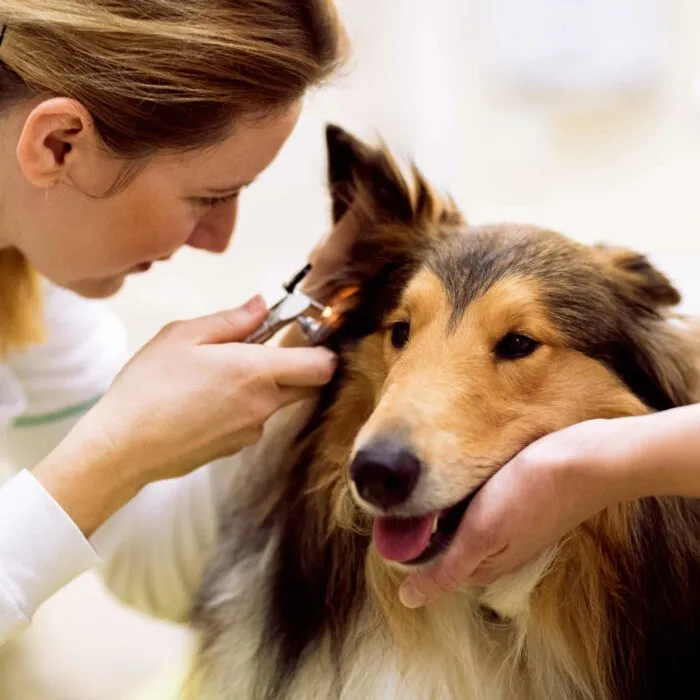Is your dog constantly shaking its head or scratching at its ears? Ear infections are a common issue in dogs, affecting approximately 20% of them. If your furry friend is among them, you might be searching for a natural and effective solution. Probiotics for dogs, specifically in ear care products, could be the answer you’ve been looking for.
Why Consider Probiotics for Dog Ear Infections?
Probiotic ear care sprays offer a gentle yet effective way to maintain ear health and prevent infections.
Here’s how they work:
- Prevent Bacterial Infections: Probiotics actively help keep your dog’s ears clean and comfortable, preventing infections before they start.
- Support Healing: Veterinarians have successfully used probiotic sprays to manage recurrent ear infections naturally and safely, even when other treatments have failed.
Many pet owners have seen remarkable results using probiotics. In one case study, a vet used probiotics when antibiotics stopped working for a dog with recurring ear infections. Two dog owners also shared testimonials. They said, “The spray has helped him and he is so much happier,” and, “We can’t recommend this product enough.”
This information focuses on dog ear care, but probiotic ear sprays are also suitable for cats, rabbits, horses, and other animals. Important Note: Always consult your veterinarian if your pet shows signs of an ear infection or if you’re unsure about the best course of action.
 LUCAA+ Pet Ear Care spray prevents bacterial ear infections in dogs and cats
LUCAA+ Pet Ear Care spray prevents bacterial ear infections in dogs and cats
Understanding Dog Ear Infections
Ear infections are a common and often recurrent problem for dogs. Most are caused by harmful bacteria, but yeast and ear mites can also contribute.
What Causes Dog Ear Infections?
Dogs are more susceptible to ear infections than humans due to the shape of their ear canal. The ‘L’ shape traps moisture, creating an ideal environment for bacteria and yeast to thrive.
Most infections occur in the outer ear canal (otitis externa). However, they can also affect the middle (otitis media) and inner ear canal (otitis interna).
 Dogs are more prone to ear infections than humans because their ear canal forms an ‘L’ shape that holds moisture. And moisture creates an ideal environment for bacteria and yeast growth.
Dogs are more prone to ear infections than humans because their ear canal forms an ‘L’ shape that holds moisture. And moisture creates an ideal environment for bacteria and yeast growth.
Risk Factors to Consider
Certain factors increase a dog’s risk of developing ear infections:
- Breed: Dogs with floppy ears, such as spaniels, beagles, and basset hounds, are particularly prone to ear infections.
- Local factors:
- Moisture
- Wax build-up
- Foreign bodies or injuries
- Use of harsh cleaning products that disrupt the ear’s natural microbiome
- Underlying Medical Conditions
- Allergies: Approximately 50% of dogs with allergic skin disease also develop ear infections.
- Autoimmune and endocrine disorders
- Food sensitivities, often linked to yeast overgrowth
- Recent Activities
- Bath water entering the ears
- Swimming in contaminated water
- Grooming practices like trimming or plucking ear hair
 natural dog ear cleaner
natural dog ear cleaner
Recognizing Symptoms
If your dog exhibits any of the following symptoms, they may have an ear infection:
- Persistent head shaking or whining
- Scratching or pawing at their ears
- Redness, swelling, or pain in the ear
- Scabs, discharge, or excessive wax build-up
 natural dog ear cleaner
natural dog ear cleaner
Untreated ear infections can lead to serious complications, including balance problems, facial paralysis, and even deafness. In severe cases, surgery may be necessary to clean the ears and remove diseased tissue. This surgery, called total ear canal ablation, results in permanent hearing loss in the affected ear.
Probiotic Ear Cleaners: A Proactive Approach
Ear infections can significantly impact your dog’s quality of life. Probiotic ear care offers a proactive approach to maintaining ear health and preventing problems.
This non-invasive spray helps keep ears comfortable and reduces the risk of bacterial infections. It can also help to reduce the length and severity of flare-ups and the need for antibiotics and serious operations.
 Probiotic ear cleaner
Probiotic ear cleaner
Regular cleaning with a probiotic ear cleaner helps restore and maintain a healthy ear by:
- Balancing the ear microbiome
- Helping to prevent ear infections
- Reducing itching and inflammation
- Safely and thoroughly cleaning the inner ear
How to Use Probiotic Ear Cleaner
- Wash your hands. Spray directly into the ear. If your dog is sensitive to the spray, apply it to the inner ear using a clean cloth or lint-free gauze or cotton pad wrapped around your finger (use a separate pad for each ear).
- Apply between twice daily and twice weekly depending on the ear condition.
Note: Avoid using other topical ear medications or cleaners simultaneously, as this can reduce the effectiveness of the probiotics. Consult the product instructions or contact the manufacturer for more information.
How Probiotics Work
Probiotic ear cleaners utilize beneficial bacteria from plants to naturally and safely support your dog’s ear health. They work in two main ways:
- Inhibiting harmful bacteria: The probiotics outcompete harmful bacteria, reducing the risk of infections.
- Supporting a healthy ear microbiome: Restoring balance to the community of microorganisms within the ear improves comfort and hygiene, preventing issues before they start.
Wider benefit – protecting antibiotic effectiveness: Probiotics help prevent bacterial infections without contributing to antimicrobial resistance (AMR). AMR is a growing concern, where bacteria evolve to resist once-effective treatments. Probiotic ear spray cares for your dog and helps preserve the effectiveness of antibiotics, which are a crucial medical resource.
 Antibiotics
Antibiotics
Additional Benefits of Probiotic Ear Care Sprays
Addressing Itchy Ears Caused by Ear Mites
While not specifically designed for ear mites, probiotic ear care sprays can help relieve the itching and inflammation they cause. The probiotics soothe discomfort by consuming the ear mite’s waste, a bio-allergen, as a natural food source.
Managing Yeasty Ears
Probiotic ear care can also help with yeast overgrowth, although results may take time. Yeast infections often occur when the ear’s microbiome is disrupted by factors like moisture, allergies, or antibiotics. Probiotics restore balance by repopulating the ear with beneficial bacteria, making it harder for yeast to thrive.
Yeast overgrowth has many different causes, including diet and environmental factors such as cleaning chemical use. We always recommend looking at the wider picture as it is often an “every little bit helps” situation. For best results, seek out reliable nutritional advice and look for a natural way to remove the established yeast.
Follow antifungal treatment immediately with probiotic ear care to prevent recurring infections. This approach avoids the issue of products that wipe out the microbiome in the ear, leaving it undefended against new pathogens.
Real-Life Success Stories
Here are stories of how probiotic ear care helped three dogs:
Ben’s Story – A Vet’s Case Study
Topical probiotics helped Ben, an eight-year-old Newfoundland, when antibiotics stopped working.
 Newfoundland
Newfoundland
Ben presented with inflamed ears and an infection in his left ear. After initial antibiotic treatment, the infection returned with antibiotic-resistant bacteria. Ben’s veterinarian, Richard Doyle, decided to try a probiotic ear care preparation. After treatment, new swabs did not culture any pathogenic bacteria, and four months later, Ben had not suffered any further ear infections.
Pongo’s Story
 Dalmation
Dalmation
“My Dalmatian Pongo has suffered from recurring nasty ear infections since a puppy. He has had surgery many times to have his ears deep cleaned and treated. The infections get so bad it affects his eardrum. My vet eventually transferred us to the Royal Veterinary College (RVC) to investigate and be treated. The RVC found seven different types of bacteria and infection in his ear… We started using the spray to treat his ears and his ears cleared of all infections! We now spray his ears twice a week to keep on top of it but Pongo hasn’t had an infection for 6 months. The spray has helped him and he is so much happier.” – Gabrielle MacKenzie
Mylo’s Story
 natural dog ear infection prevention
natural dog ear infection prevention
“Our dog, Mylo, suffered from multiple ear infections as a puppy… After having an operation under general to clean out his ears, he got another infection. When we went back to the vets LUCAA+ Probiotic Pet Ear Care was suggested. It worked wonders; Mylo’s ears cleared up… We can’t recommend this product enough.” – Lucy Uwins
Keep Your Dog’s Ears Healthy and Happy
Probiotics for dogs are a safe and effective way to maintain ear health, helping with chronic infections, itching from ear mites, and preventing future issues. It supports a healthy microbiome and helps stop harmful bacteria from growing.
A probiotic approach helps your dog feel better and stay healthy, preserving antibiotic effectiveness.
Important Note: Probiotic ear care helps your dog’s ears become and stay healthier. Please use sensible caution and always consult your vet if your dog is unwell, has signs of infection or if in any doubt. It is important to act quickly if an ear infection does occur. In this case, we always recommend asking your vet. If your dog is prescribed antibiotics, our recommendation is to always finish the course.
